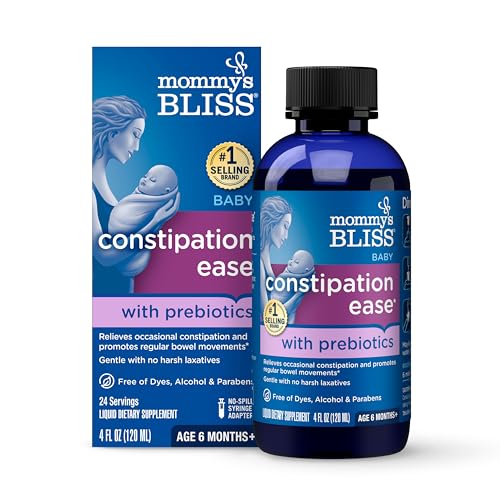Let's face it; dealing with a newborn struggling with poop can be a messy situation. However, fear not, as we are here to guide you through this common challenge with practical tips and strategies.
From understanding the causes of constipation in newborns to gentle remedies and preventive measures, we've got your back.
So, if you want to secure your little one's comfort and well-being, stick around to discover how you can navigate through this poop predicament like a pro.
Key Takeaways
- Monitor bowel movements for frequency and consistency.
- Recognize signs of constipation like straining or blood in stool.
- Use gentle remedies such as fruit juice or belly massages.
- Seek medical help promptly for concerning symptoms like vomiting or persistent constipation.

Frida Baby Windi Gas Passer, Baby Gas Relief, Made in USA, 100% Natural, Safe & Effective Instant Relief for Babies & Infants, 10ct
INSTANT BABY GAS RELIEF: Say goodbye to gassy grimaces with our ingenious hollow tube that works like magic…
As an affiliate, we earn on qualifying purchases.
As an affiliate, we earn on qualifying purchases.
Understanding Newborn Constipation
When dealing with newborn constipation, it's essential to be aware of the frequency and consistency of your baby's bowel movements. In babies, constipation can present as infrequent bowel movements, with formula-fed infants typically going every 1-2 days without passing stools. On the other hand, breastfed babies might experience constipation if they go longer than a week without a bowel movement. It's vital to observe any signs of straining during bowel movements or the presence of blood in the stool, as these could indicate constipation in newborns.
Understanding the normal patterns of bowel movements in babies is key to identifying constipation early on. If your baby is having difficulty passing stools or seems uncomfortable, it's important to seek guidance from a healthcare provider. Additionally, lack of bowel movements accompanied by symptoms like vomiting or abdominal swelling may signal a more serious underlying issue that requires prompt medical attention. By monitoring your baby's bowel movements and recognizing the signs of constipation, you can take proactive steps to address any concerns and guarantee your baby's comfort and well-being.

Mommy's Bliss Constipation Ease + Prebiotics, Relieves Occasional Constipation, Gentle & Safe, No Harsh Laxatives, 4 Fl Oz Bottle (Pack of 1)
Gentle Ingredients: Naturally and gently relieve occasional baby and toddler constipation without any harsh chemical laxatives; Made with…
As an affiliate, we earn on qualifying purchases.
As an affiliate, we earn on qualifying purchases.
Recognizing Constipation Symptoms

Recognizing constipation symptoms in newborns involves paying close attention to their bowel movements and any signs of discomfort or unusual behavior. One key indicator of constipation in newborns is infrequent or absent bowel movements.
If your baby is straining during bowel movements or passing hard, pellet-like stools, these could be important signs of constipation. Additionally, be on the lookout for blood in the stool, abdominal swelling, or excessive fussiness, as these can also indicate constipation in newborns.
If your baby is vomiting along with having a lack of bowel movements, it may signal a more serious issue that requires immediate medical attention. Knowing when to seek medical help for constipation in newborns is important for ensuring your baby's health and well-being.

BioGaia Protectis Baby Probiotic Drops | Baby Essentials for Colic & Gas Relief | Safe for Newborns | Ease Crying, Fussing, Colic, Gas, Spit-ups & Constipation | No Dairy, Soy & Gluten | 5mL
SOOTHES CRYING, FUSSING, COLIC & GAS: For over 20 years, BioGaia Baby has been soothing babies with colic…
As an affiliate, we earn on qualifying purchases.
As an affiliate, we earn on qualifying purchases.
Gentle Remedies for Newborn Constipation
To address newborn constipation effectively, consider gentle remedies such as offering small amounts of 100% fruit juice or introducing pureed fruits like prunes to stimulate bowel movements. These natural remedies can work wonders in easing your newborn's discomfort. Fruit juices like prune, pear, or apple contain sorbitol, a type of sugar alcohol that helps draw water into the intestines, making stools softer and easier to pass.
Pureed fruits are rich in fiber, which adds bulk to the stool and promotes regular bowel movements. Additionally, making sure your newborn stays hydrated is important for preventing and relieving constipation. Implementing gentle belly massages or leg exercises can also aid in stimulating bowel movements.

Frida Baby Gassy Belly Rub | Infant Gas Relief | Baby Gas Relief Rub for Belly Massages Made with Natural Oils
GAS RELIEF: Belly massages help gas bubbles work their way out of baby's system.
As an affiliate, we earn on qualifying purchases.
As an affiliate, we earn on qualifying purchases.
Knowing When to Seek Medical Help

Seek immediate medical assistance if your newborn displays signs of constipation such as infrequent bowel movements or excessive straining. While babies usually experience some irregularity in their bowel habits, certain symptoms warrant a call to your baby's healthcare provider.
Always contact your pediatrician if you notice blood in your baby's stool, abdominal bloating or pain, or if your newborn is vomiting due to constipation. These signs could indicate a more serious issue that requires immediate medical attention.
Trust your instincts as a parent; if you feel concerned about your newborn's bowel movements, it's important to seek professional advice. If your baby's constipation persists despite trying gentle home remedies, it's advisable to schedule an appointment with your pediatrician for a thorough evaluation and appropriate management.
Preventing Constipation in Newborns
To prevent constipation in newborns, it is important to pay close attention to their feeding habits and make sure they are adequately hydrated. Breastfed babies may have fewer bowel movements, which is normal, but if they go up to a week without pooping, it can be concerning. Formula-fed newborns usually have more regular bowel movements, typically every 1-2 days. Monitoring diaper output and looking for signs of straining during bowel movements is vital in identifying constipation early on. Introducing fruit juice or high-fiber foods like prunes when starting solids can also help guarantee prevent constipation in newborns. Below is a table summarizing key points when starting solids in preventing constipation in newborns:
| Key Points | Details |
|---|---|
| Feeding Habits | Monitor frequency and consistency of feeding |
| Hydration | Ensure newborn is adequately hydrated |
| Diaper Output | Regularly check diapers for signs of constipation |
| Signs of Straining | Watch for signs of discomfort or straining during bowel movements |
| Introducing Solids | To consider adding fruit juice or high-fiber foods like prunes when starting solids |
Frequently Asked Questions
Can Introducing Solid Foods Too Early Cause Constipation in Newborns?
Introducing solid foods too early can disrupt a newborn's digestion, potentially leading to constipation. It's important to wait until your baby's digestive system is ready to handle solids to avoid this issue and support their overall health.
How Can Breastfeeding or Formula Feeding Affect a Newborn's Bowel Movements?
Breastfeeding or formula feeding deeply impacts a newborn's bowel movements, akin to a gentle river's flow. Breastfed babies often have softer, more frequent stools due to easily digestible components, while formula-fed infants may have firmer, less frequent bowel movements.
Are There Any Natural Remedies or Supplements That Can Help With Newborn Constipation?
Yes, natural remedies like prune juice or gentle tummy massages can help with newborn constipation. Always consult with a pediatrician before trying any new supplements. We've found these methods effective for our little one.
Can Certain Medications or Medical Conditions Contribute to Constipation in Newborns?
Certain medications like iron supplements or opioids can contribute to constipation in newborns. Medical conditions such as hypothyroidism or Hirschsprung's disease may also lead to this issue. Consult a healthcare provider for proper evaluation and management.
How Often Should a Newborn Have a Bowel Movement, and What Is Considered Normal?
As newborns, we should have bowel movements at least once a day. Normal frequency varies; it could be after every feeding or every few days. However, consistency is key. Consult a healthcare provider if concerned.
Conclusion
To sum up, managing newborn constipation can be challenging, but with gentle remedies and proper guidance, it's manageable. Remember, trust your instincts as a parent, and seek medical help if needed.
By offering fruit juice, introducing high-fiber foods, and ensuring hydration, you can help your baby find relief. Stay proactive in preventing constipation, and remember, a happy baby means a happy parent.
So, stay informed, stay prepared, and enjoy the journey of parenthood.









